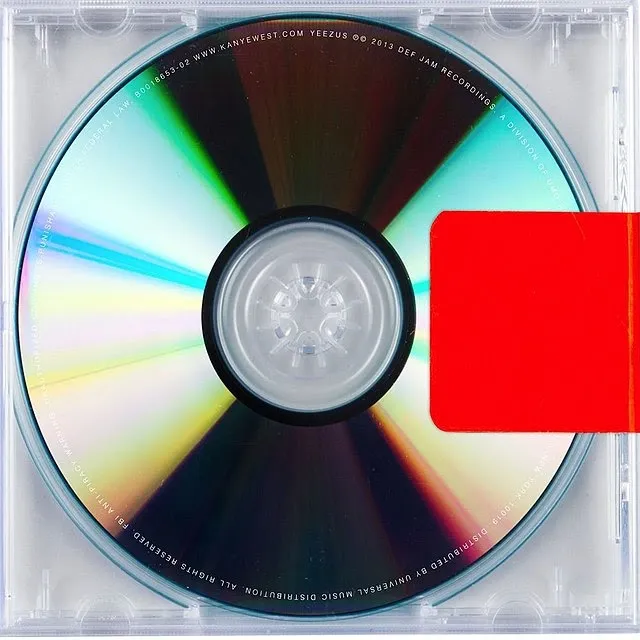The year is 2013 — Lance Armstrong’s doping scandal and the Boston Marathon bombings are dominating the headlines, Thanos only exists in post-credit scenes and Kanye West is on top of the musical world. Coming off the smashing successes of his magnum opus “My Beautiful Dark Twisted Fantasy” (MBDTF) and his bombastic Jay-Z collaboration “Watch The Throne,” the world eagerly waited to see what West would do next. As we celebrate the eighth anniversary of “Yeezus,” let’s dive into the impact of West’s most polarizing and distinctive project yet.
From the album’s cover to its title — a play on his alter ego as Jesus — West foreshadows the album’s minimal and unapologetic persona. This sentiment is projected through the materialistic opener “On Sight,” in which West bluntly unveils his new mantra: “How much do I not give a f**k? Let me show you right now ‘fore you give it up.”
The track, which features the distorted drums and synths that encapsulate much of “Yeezus,” sets the scene for the album’s brash sonic character. Featuring production from electronic gurus Daft Punk along with Rick Rubin and Arca, the harsh soundscape was manufactured to divide fans and critics.
“A lot of the production was a lot more discombobulated, experimental and aggressive,” Ryan Dombal, a features editor with Pitchfork, said. “All these things weren’t really things you would think about when you think of Kanye, especially at that time.”
West’s unapologetic attitude only manifests further as the tracks progress, leading to comedic highs like “I Am A God”’s, “Hurry up with my damn croissants,” as well as abhorrent lows. Songs like “I’m In It” feature demeaning bars such as “Put my fist in her like a civil rights sign,” reducing emblems of racial justice to metaphors for his carnal desires.
Though the discordant production and problematic lyrics divide many listeners, the topics discussed throughout the record on tracks like “New Slaves” — private prisons, racial inequality and America’s drug crisis —provide valuable insight into the struggles Black people in America face.
As West observes, “You see it’s broke n***a racism/That’s that ‘Don’t touch anything in the store’/And it’s rich/n***a racism/That’s that ‘Come in, please buy more.’”
In addition, the 22-time Grammy winner laments the struggles that pushed him to create “Yeezus.” At the time, he was finishing up an unsuccessful attempt to enter the world of fashion, citing longtime racial barriers as his main obstacle. West’s decision to use his platform to illuminate race-related issues undoubtedly helped educate and inspire others.
“A lot of the things that he was talking about then are still happening,” Dombal said. “And I think there’s more awareness about them, which is really good.”
Filled with determination and public-facing frustration, songs like “I Am A God,” an egocentric track with lines such as “Soon as they like you make ’em unlike you ‘Cause kissing people a** is so unlike you,” further show his unwillingness to bend to popular demand.
Despite the initial backlash, “Yeezus” has ascended the ranks of hip hop, becoming one of the most impactful albums of the 2010s. The same jarring atmosphere and minimalism that led many fans to denounce West upon release can be found in the works of pop culture icons like Billie Eilish and Lorde.
“When [Eilish] was doing some more of a gothy sort of music, I thought that it actually sounded a lot like Yeezus,” Dombal said.
Though West’s discography is unquestionably filled with musically diverse records, his unrivaled production skills coupled with his deft lyricism and messaging put “Yeezus” on par with his past triumphs.
“[His discography] showed me that there are a lot of different ways to create a good song,” Karthik Jetty ’24 said. “He’s really known for his producing and … it feels like he makes songs almost out of nothing.”
As West has since continued to reinvent himself throughout the decade with introspective records like “The Life of Pablo,” his most experimental achievement undoubtedly paved the way sonically for the next generation of artists and listeners.
Though often overshadowed by the masterful MBDTF, 2013’s “Yeezus” is far deeper and more complex than its lewd lines and imagery suggest. Boldly mixing French electro-pop and dancehall with hip hop, the record was born out of years of frustration and a desire to break through the barriers of the fashion world.
The pronounced and at times graphic work also features salient commentary on racial issues like America’s prison industrial complex and drug crises that continue to disproportionately affect the African-American community. Eight years after its release shocked the world, West’s iconic project is perhaps more firmly entrenched in pop culture and music at large than ever.
